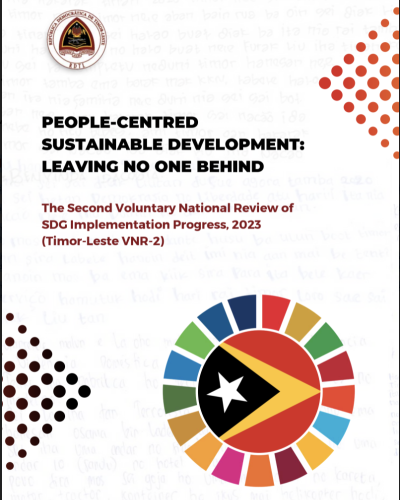PEOPLE-CENTRED SUSTAINABLE DEVELOPMENT: LEAVING NO ONE BEHIND

The Second Voluntary National Review of SDG Implementation Progress, 2023 (Timor-Leste VNR-2)
The commitment of Timor-Leste to people-centered sustainable development is at the core of its pursuit of the Sustainable Development Goals (SDGs). The Second Voluntary National Review (VNR-2) highlights both successes and setbacks in the implementation of the SDG sectors, providing valuable insights and lessons for other nations.
The VNR-2 drew inspiration from lost postcards written by Timorese youth in 2002, envisioning a future with peace, democracy, quality education, secure employment, improved living conditions, and technological advancements. While the first VNR focused on SDG 16, the VNR-2 focuses on the well-being of the people, mainly covering SDGs 1-5, 8, 16, and 17.
However, the socioeconomic impact of multiple shocks in Timor-Leste has been detrimental to gains in development. Triple shocks from political impasse, pandemic effects, and natural disasters have slowed down progress in human development and hindered sustainable economic growth and diversification. Job losses and income reductions for households and businesses were high, schools and other social services were disrupted, and infrastructure was damaged. These shocks have hit the country at a time when the main source of income for Timor-Leste, the Petroleum Fund, could be depleted by the end of the decade.
As a result, a crucial trade-off has emerged between achieving fiscal consolidation and maintaining robust social protection, particularly during times of multiple shocks. On one hand, the necessity of fiscal consolidation and structural reforms to ensure long-term fiscal sustainability is apparent. This will necessitate an increase in domestic revenue beyond the contributions from the Petroleum Fund, as well as a rationalization of government expenditures in upcoming budgets. On the other hand, there is an immediate need to safeguard the citizens through comprehensive social programs during these challenging times. The Government of Timor-Leste has prioritized the latter.
The Economic Recovery Plan was formulated to effectively manage this trade-off, guided by the principle of 'transforming better'. This approach underscores the government's commitment to both immediate social protections and long-term economic sustainability. The Economic Recovery Plan measures sought to ensure no one was left behind, contributing to Timor-Leste emerging from the pandemic crisis stronger, more cohesive, and more united. The 2.9% GDP growth rate in 2021 stands as a testament to the economic recovery.





















